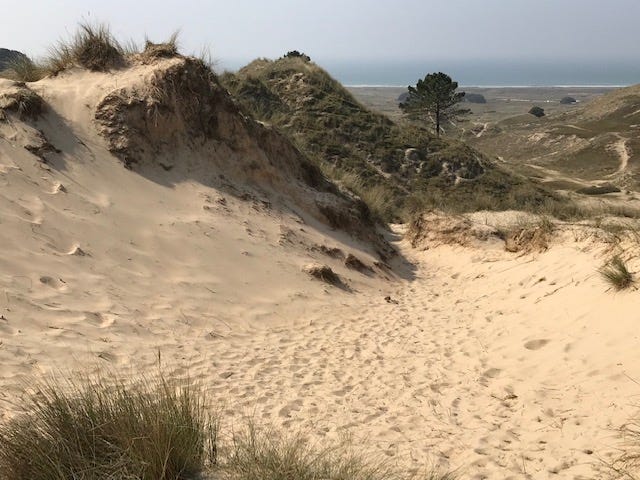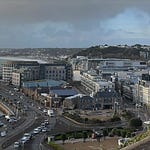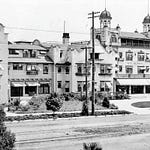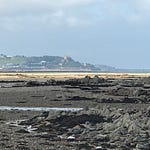Welcome to another episode of The History Islands. This month’s story is an origin myth. It explains how the sand dunes of Les Quennevais, in the west of Jersey, came into being.
It is an ancient legend, recorded in the nineteenth century but probably dating back to a much earlier age. The story is called Wreckers of Winter Night.
St Ouen’s Bay
Late November 1494
Winter had fallen hard upon Jersey. As the red sun collapsed below the western horizon, the sky was smeared with blood. The first breath of frost already sparkled on the higher ground, heralding a bitter night to come. Far to the north, a black storm was brewing.
A gaggle of men was tramping west through the fields, headed for St Ouen’s Bay. They were vicious outlaws, bearing halberds, pikes, and skewers – the brutal instruments of war. A motley army, a drunken band of brothers, they wore stolen armour and pilfered boots. Their favourite pastimes were blind drunkenness, spiced with a little light brawling and the occasional murder. The gang of thieves would indulge in every one of these vices in the fearful night to come.
The rolling pastures they strolled through were a byword for bounty. Les Quennevais famously boasted the most fertile fields of the entire Island. Tradition said you merely had to plant an apple seed here in Spring and an orchard would flourish by the autumn.
But these men had neither the patience nor wit for farming. They were predators. When the storms rose, when the waves lashed, they would light beacons on the shore. False fires lured in passing ships, drawing in the weak and the desperate. And when their prey splintered on the rocks at Corbière, they would swoop down like vultures to claim their loot.
And tonight, they had spied five great vessels. They loomed as black as clouds on the sparkling horizon, wounded and limping after some mid-Channel clash, desperate for sanctuary. The galleons seemed frozen on the painted ocean, silhouettes against the dying sun. Tonight, each one of them would be broken on the rocks.
The robbers lit a campfire and threw a bladder of cheap wine around. They were cursing, spitting, mocking the fools who were to be their feast. The old women in the village had, as usual, begged them not to do it. Had not the ground beneath them shaken only the day before, surely a macabre omen? Plundering these ships, they whispered, would only bring ill.
Lamy, a young hothead, scoffed at such cowardly blather. He brandished an arquebus, an exquisite firearm forged by the finest Mediterranean gunsmiths. He had ripped it last winter from the hands of a dying nobleman. His fellow wrecker, Grandin, sharpened his brute hatchet on a rock. As they drank deeper and gorged their imaginations on the plunder ahead, their boasts fell like rain.
Suddenly a stranger stood at the gate of the camp. Who dared to broach this den of thieves? All eyes turned to the intruder, and all hands clasped their weapons. Yet there could be nothing to fear. The visitor was just a frail old man, bent by age, yet pulsing with a wiry strength that belied his years. He wore the faded, tatty robes of a wandering monk. The thieves peered closer at him. There was something strange about his face, something curiously familiar. They could not place it. No matter.
‘What do you want, old man?’, Grandin sneered.
The stranger fixed them with burning blue eyes, full of sadness and wisdom. He wore a wooden crucifix at his neck, and he spoke with the sorrow of centuries. ‘Turn back, my friends. Turn back while there is time. The Lord has seen your hearts, and he knows what you are planning. Be warned, my children. If you do not stop now, then His judgment will fall on you, and upon your land’.
The robbers howled and hooted with laughter. Then they spat at him and tossed a couple of stones in his direction, shooing him away into the blackness of the night. The wind was whispering by now, then wailing, then shrieking. The storm was coming. Lamy, in a moment of mad exultation, fired his arquebus into the winter night, and the explosion shattered the muggy skies. The gunshot was lost in a volley of thunder, and the first heavy drops of rain began to fall.
The pirates set to work, lighting stacks of brushwood, great flaming bonfires on the headlands, the better to lure the ships to their doom. The galleons, they could see, were soon falling for the ruse. Their masts were broken; like lumbering whales, they would inexorably be dragged in towards the rocks.
Soon enough, the first ship splintered, knifed in the heart by the daggers of Corbière. Place of evil, place of the crows, shunned by all Islanders; but loved by these brigands. They knew well enough the secret passages between the tides, and they swooped in like vultures.
A torrent of broken wood and sailcloth burst upon the shoreline. The ships must have been packed with rich cargo, for barrels and chests floated in the wake of the drowned ship. Lamy and Grandin dashed into the freezing water and grappled to open the first cargo trunk. The clasp on it burst to reveal a trove of silks and jewels.
Then they heard a plaintive cry in the darkness. A small rowing boat, beaten by the waves, had made landfall. It bore three Spanish noblemen, plucked from the sun-drenched palaces of Segovia or Zaragoza, and now hurled upon this wintry rock. And in their midst was a beautiful noblewoman, clutching a tiny, wailing baby.
The pirates paused for a moment, but soon scoffed at the thought of mercy. They made short work of their prey. A crossbow bolt in the heart, the crushing blow of a wrecking-hook: two of the half-drowned noblemen were soon dead. Lamy, in the bloodlust of the attack, let loose his arquebus at the third. A cloud of smoke and acrid powder choked him, and the burst of the shot sent his ears singing. He must have scored a direct hit. Staggering towards him was the bloodied figure who had taken the full force of the blast. Lamy recognised the victim and his heart burst. This man was the spitting image of his own father.
The Lady had broken free from the ambush and had scrambled up a rock. In the moonlight, they could see that she was bedecked in exquisite jewellery, dripping with diamonds and gold, everything the pirates had ever longed for. Her infant child, nestled in her arms, was serene now, strangely beatific despite the howling storm. The wreckers climbed up after her, and soon there were no more ledges left to climb, no routes to safety. The raging sea was around them all, and everywhere, and below.
The Lady turned to face her accusers and cried out to them in a clear and courtly French, their own tongue. ‘You have preyed on a defenceless woman and her child. This is your reward. Your land will become a desert. No crop will grow there again. And the sea will rise up and claim you all’. Then she stepped with her child straight off the rock, down into the abyss of the night.
And as she did so, the earth shook itself like an angry bull shaking off a fly. Lamy and Grandin looked up in terror. The bay itself was turning on the wreckers. A giant funnel-wave, a wall of water as sheer as Gorey Castle, reared up straight ahead of them. The surge was lethal, loaded with ship-timbers and wreckage, primed to shred its victims. The thieves were ripped to ribbons by their own loot. The bodies of the wrecking gang would never be found.
Then, as it made landfall, the waterspout became a great red sandstorm, tearing up into the fertile farms and orchards by the bay. It churned the fields into fine powdery dust, and in its wake came a scorching wall of wildfire. The fields blazed for seven days, burning to the roots. When the ashes were cleared, the rich soil of Les Quennevais had changed. The land had become sand-dunes; a barren waste.
In the deepest days of winter, a frail old man walked there at evening-tide, as the sun sank over the western bay. He placed a wooden cross in the sand and knelt before it, to pray for the souls of the dead.
This story is one of many in Jersey: Secrets of the Sea, published by Seaflower Books and available on Amazon.co.uk and across Jersey. © 2019, 2022 Paul Darroch
Thanks to the Digital Leadership Programme at Digital Jersey for podcast training and music licensing.















